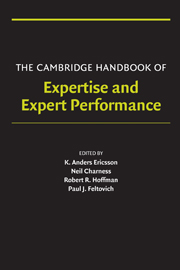Crossref Citations
This Book has been
cited by the following publications. This list is generated based on data provided by Crossref.
Ohlsson, Stellan
2001.
The Cambridge Handbook of Computational Psychology.
p.
359.
2001.
The Cambridge Handbook of Computational Psychology.
p.
187.
Posch, Alfred
and
Mieg, Harald A.
2006.
System experts and decision making experts in transdisciplinary projects.
International Journal of Sustainability in Higher Education,
Vol. 7,
Issue. 3,
p.
341.
Duffy, Patrick J.
Lyons, Deirdre C.
Moran, Aidan P.
Warrington, Giles D.
and
MacManus, Caroline P.
2006.
How we Got Here: Perceived Influences on the Development and Success of International Athletes.
The Irish Journal of Psychology,
Vol. 27,
Issue. 3-4,
p.
150.
Baron, Robert A.
and
Ensley, Michael D.
2006.
Opportunity Recognition as the Detection of Meaningful Patterns: Evidence from Comparisons of Novice and Experienced Entrepreneurs.
Management Science,
Vol. 52,
Issue. 9,
p.
1331.
Hoffman, Robert R.
Coffey, John W.
Ford, Kenneth M.
and
Novak, Joseph D.
2006.
A Method for Eliciting, Preserving, and Sharing the Knowledge of Forecasters.
Weather and Forecasting,
Vol. 21,
Issue. 3,
p.
416.
Taraban, Roman
DeFinis, Alli
Brown, Ashlee G.
Anderson, Edward E.
and
Sharma, M. P.
2007.
A Paradigm for Assessing Conceptual and Procedural Knowledge in Engineering Students.
Journal of Engineering Education,
Vol. 96,
Issue. 4,
p.
335.
Baron, Robert A.
2007.
Behavioral and cognitive factors in entrepreneurship: entrepreneurs as the active element in new venture creation.
Strategic Entrepreneurship Journal,
Vol. 1,
Issue. 1-2,
p.
167.
Bauer, Johannes
and
Gruber, Hans
2007.
Workplace changes and workplace learning: advantages of an educational micro perspective.
International Journal of Lifelong Education,
Vol. 26,
Issue. 6,
p.
675.
Bauer, Johannes
and
Mulder, Regina H.
2007.
Modelling learning from errors in daily work.
Learning in Health and Social Care,
Vol. 6,
Issue. 3,
p.
121.
2007.
Stories of Modern Technology Failures and Cognitive Engineering Successes.
p.
1.
Anders Ericsson, K.
Roring, Roy W.
and
Nandagopal, Kiruthiga
2007.
Giftedness and evidence for reproducibly superior performance: an account based on the expert performance framework.
High Ability Studies,
Vol. 18,
Issue. 1,
p.
3.
Roring, Roy W.
Nandagopal, Kiruthiga
and
Ericsson, K. Anders
2007.
Can the Parieto-Frontal Integration Theory be extended to account for individual differences in skilled and expert performance in everyday life?.
Behavioral and Brain Sciences,
Vol. 30,
Issue. 2,
p.
168.
Anders Ericsson, K.
Roring, Roy W.
and
Nandagopal, Kiruthiga
2007.
Misunderstandings, agreements, and disagreements: toward a cumulative science of reproducibly superior aspects of giftedness.
High Ability Studies,
Vol. 18,
Issue. 1,
p.
97.
Crutcher, Robert J
2007.
CAPAS 2.0: A computer tool for coding transcribed and digitally recorded verbal reports.
Behavior Research Methods,
Vol. 39,
Issue. 2,
p.
167.
Ward, Paul
Hodges, Nicola J.
Starkes, Janet L.
and
Williams, Mark A.
2007.
The road to excellence: deliberate practice and the development of expertise.
High Ability Studies,
Vol. 18,
Issue. 2,
p.
119.
Ericsson, K. Anders
and
Ward, Paul
2007.
Capturing the Naturally Occurring Superior Performance of Experts in the Laboratory.
Current Directions in Psychological Science,
Vol. 16,
Issue. 6,
p.
346.
Shupe, David
and
Tagg, John
2007.
Learning outcomes and the development of expertise.
On the Horizon,
Vol. 15,
Issue. 2,
p.
89.
Jason, Hilliard
2007.
Becoming a truly helpful teacher: considerably more challenging, and potentially more fun, than merely doing business as usual.
Advances in Physiology Education,
Vol. 31,
Issue. 4,
p.
312.
Farmer, Katherine A.
McGrath, Susan P.
and
Blike, George T.
2007.
An Experimental Architecture for Observation of Triage Related Decision Making.
p.
1774.



